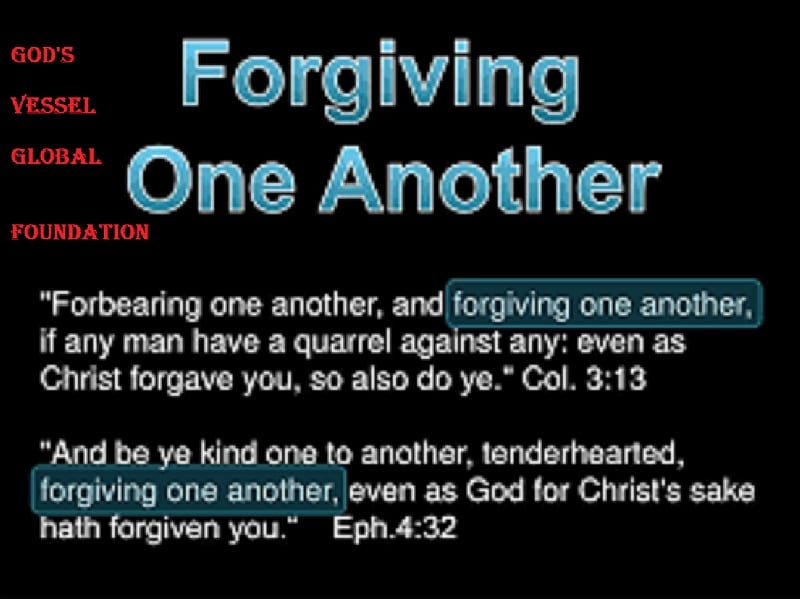This message centers around the vital importance of forgiveness, both of oneself and of others, as a cornerstone of spiritual growth and a pathway to inner peace. The speaker, addressing the audience as beloved children of God, emphasizes the detrimental effects of harboring unforgiveness and the transformative power of releasing past hurts. Drawing upon biblical teachings and invoking divine authority, the message urges listeners to embark on a journey of self-forgiveness and reconciliation, paving the way for healing and a closer relationship with God.
The message begins by acknowledging the inevitability of mistakes in human life. Instead of dwelling on past errors, which can lead to feelings of guilt, shame, and missed opportunities, the speaker encourages self-compassion and forgiveness. This process of self-liberation involves confronting one’s mistakes head-on, acknowledging failures, understanding the root causes, and taking concrete steps to move forward. The speaker emphasizes the importance of releasing the burden of past mistakes and embracing the joy that the present and future hold. This self-forgiveness is portrayed not only as an act of self-care but also as a crucial step in obeying God’s command to forgive others.
The message then transitions to the broader theme of forgiving others. The speaker reiterates the divine command to be kind, tenderhearted, and forgiving, mirroring the forgiveness that God extends to humanity through Christ. The ability to forgive others is directly linked to the capacity to forgive oneself. Recognizing our own human frailty and propensity for error allows us to extend the same grace to others. The example of Christ dying for humanity while we were still sinners is presented as the ultimate model of forgiveness and a call to emulate this divine attribute. Holding onto unforgiveness is portrayed as a heavy burden that hinders spiritual progress and negatively impacts the one harboring the resentment more than the person who caused the offense. Therefore, letting go of unforgiveness is framed as an act of obedience to God, leading to freedom and restoration.
The speaker further reinforces the importance of forgiveness by referencing specific biblical passages that underscore the need for continuous and unconditional forgiveness. The question posed by Peter about how many times to forgive a brother is met with Jesus’ command to forgive not seven times, but seventy times seven, signifying an unending willingness to forgive. This constant forgiveness is presented as a divine mandate and a crucial element in the healing process. The speaker highlights that forgiveness is not condoning the wrongdoing but rather choosing to release the negative emotions associated with the offense. It is an act of obedience to God, while unforgiveness signifies disobedience.
The theme of confession and repentance is interwoven with the message of forgiveness. The speaker emphasizes the importance of confessing one’s own sins and seeking forgiveness, while also extending forgiveness to those who have offended us, regardless of whether they acknowledge their wrongdoing. The proverb, “He that covereth his sins shall not prosper, but whoso confesseth and forsaketh them shall have mercy,” underscores the link between confessing sins, receiving mercy, and ultimately thriving. The speaker encourages listeners to actively seek God’s grace to forgive those who have trespassed against them and to cultivate humility in confessing their own offenses. This reciprocal exchange of forgiveness is presented as a crucial step towards spiritual growth and reconciliation.
In conclusion, the message delivered by God’s Vessel Francis Ameyibor powerfully advocates for the transformative power of forgiveness. It calls upon individuals to embrace self-forgiveness as a necessary precursor to forgiving others. By drawing on biblical teachings, the message emphasizes the divine command to forgive as an act of obedience to God, leading to inner peace, healing, and spiritual liberation. It highlights the detrimental effects of harboring unforgiveness, urging listeners to release the burden of past hurts and embrace the transformative power of letting go. The message culminates in a prayer for God’s grace to facilitate both the giving and receiving of forgiveness, paving the way for spiritual renewal and a stronger connection with the divine. The inclusion of scriptural references and a personal contact further emphasizes the importance and urgency of this message, encouraging listeners to take concrete steps toward forgiveness in their own lives.


